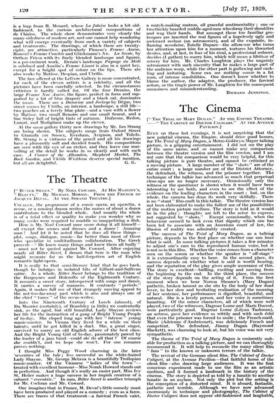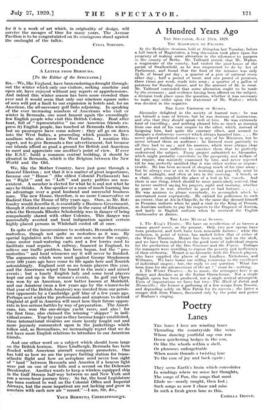The Cinema
[" THE TRIAL OF MARY DUGAN." AT THE EMPIRE THEATRE: -" THE CABINET OF DOCTOR CALIGARL" AT THE AVENUE'
PAVILION.] "
RYE/4 on these hot evenings, it is not surprising that the new palatial cinema, the Empire, should draw good houses, for The Trial of Mary Dugan, a Metro-Goldwyn-Mayer talking picture, is a gripping entertainment. I did not see the play of the same name, and so cannot niake any comparison between the theatre version and the film version, and I am not sure that the comparison would be very helpful, for this talking picture is pure theatre; and cannot be criticized as a moving picture. A large number of the " shots" are of the entire court ; a large number are of the District Attorney, the defendant, the witness, and the prisoner together. The technique of the talkie has advanced so much that perpetual close-ups are no longer necessary. Occasionally only the witness or the questioner is shown when it would have been interesting to see both, and even to see the effect of the evidence on the leading characters in the court ; but on the whole, the camera has done its work very skilfully. There is no "stunt" film-craft-in this talkie. The theatre version has not been elaborated to make the fullest use of the possibilities of the motion picture medium. The story is told as it would be in the play ; thoughts are left to the actor to express, not suggested by " shots." Except occasionally, when the behaviour seemed to lack even that dignity which one has been led to associate with an American court of law, the illusion of reality was admirably created.
The success of The Trial of Mary Dugan, as a talking picture, depends in the first place on whether one can hear what is said. In some talking pictures it takes a few _minutes to adjust one's ears to the reproduced human voice, but it is not so in this film. Whether the voice comes from a character seen on the screen or whether the speaker is " off-stage " it is extraordinarily easy to hear. In the second place, its success depends on whether what is said is worth hearing, and the reputation of the play gives ample assurance of this. The story is excellent—baffling, exciting and moving from the beginning to the end. In the third place, the success of the story depends on the acting of it. From the first moment when we hear Norma Shearer's (Mary Dugan) pathetic, broken lament as she sits by the body of her dead lover, to her slow and hesitating realization of the meaning of her sentence, her performance is dignified, beautiful, and natural. She is a lovely person, and her voice is sometimes haunting. Of the minor characters, all of which were well played, two of the witnesses, Dagmar Lorne and Marie Ducrot, were particularly good. Digmar Lorne (Lilyan Tashman), an actress; gave her evidence so wittily and with such eclat that even the prisoner,was forced to smile ; the French maid, Marie (Adrienne d'Ambricourt), was deliciously French and competent. The defendant, Jimmy Dugan (Raymond . Hackett), was charming to look at, but his voice was not very sympathetic.
The theme of The Trial of Mary Dugan is eminently suit- able for-production as a talking picture, and we can thoroughly recommend it. It will help to reconcile the many silent film " fans " to the known or unknown terrors of the talkie.,
The revival of the German silent film, The Cabinet of Doctor Caligari, at the Avenue Pavilion—that faithful home of the silent film—also drawing large audiences. It was the first• conscious experiment made to use the film as an artistic medium, and it formed a landmark in the history of the cinema. The story is depicted as told by a lunatic to another lunatic in an asylum. Not only the plot but the setting is the conception of a distorted mind. It is absurd, fantastic, pathetic and terrible. Although we have now advanced enormously in technique and photography, The Cabinet Doctor Caligari does not appear old-fashioned and laughable,
for it is a work of art which, in originality of design, will survive the ravages of time for many years. The Avenue Pavilion is to be congratulated on its courageous stand against the onslaught of the talkie.
CELIA SIMPSON.



































 Previous page
Previous page